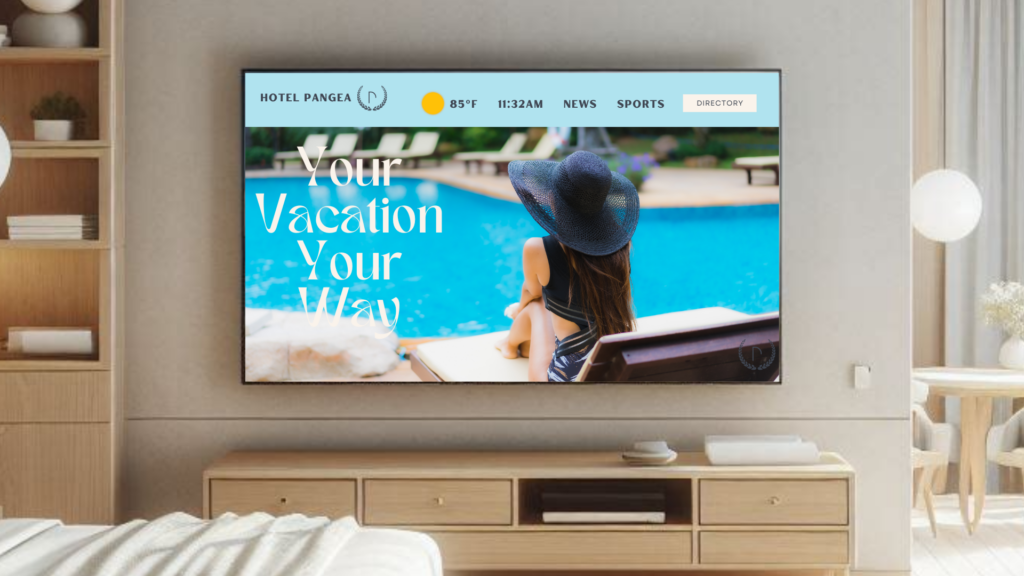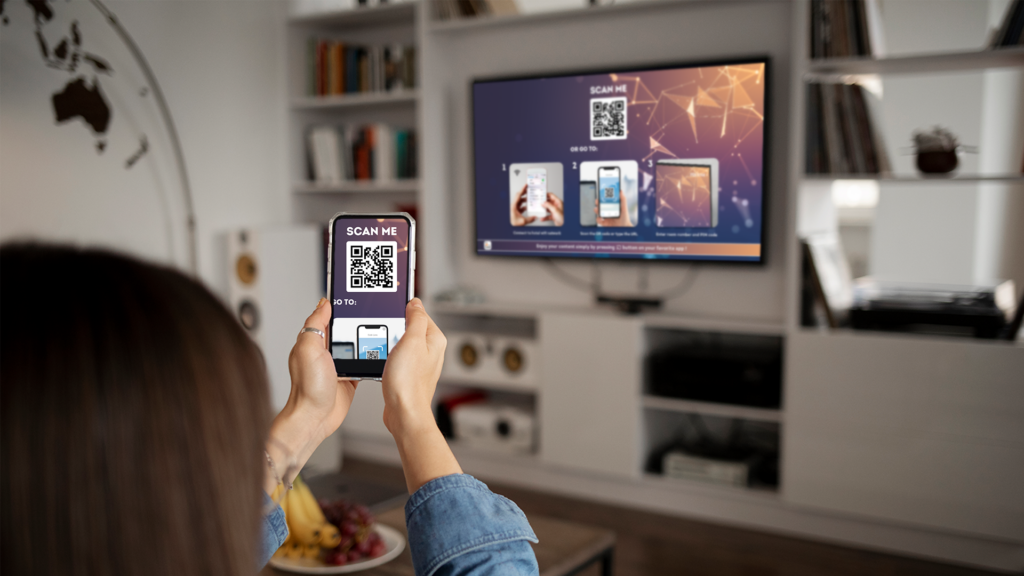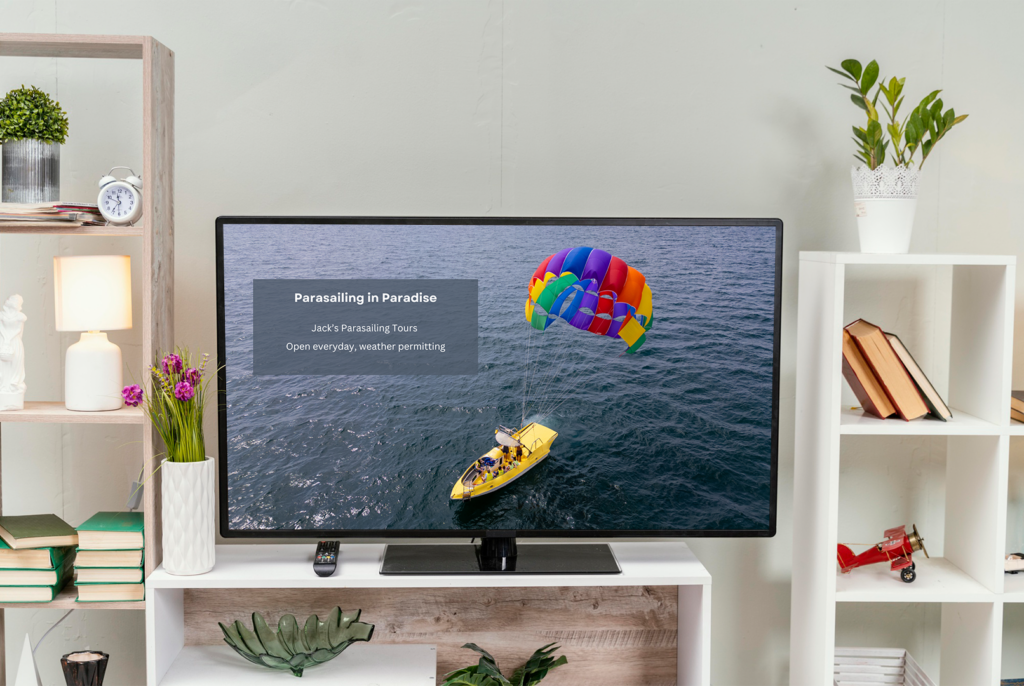Solutions TV pour hôtels : la différence entre IPTV, casting et télévision par câble

Avec toute la technologie moderne disponible de nos jours, les hôtels disposent d’un large choix de solutions de divertissement en chambre. Les propriétaires et les gestionnaires d’hôtels doivent maintenant décider laquelle des nombreuses solutions TV pour hôtels est la plus adaptée à leurs clients. Ils peuvent choisir entre la télévision par câble, dépassée et coûteuse, l’IPTV moderne mais onéreuse, ou une solution de casting pour hôtels.
Les clients s’attendent désormais à vivre des expériences égales ou meilleures que celles qu’ils ont chez eux, y compris l’accès aux services de streaming, du contenu personnalisé et des menus interactifs. Les hôteliers font face à une décision cruciale en choisissant entre l’IPTV, le casting et la télévision par câble traditionnelle, et le bon choix peut améliorer considérablement la satisfaction des clients et accroître l’efficacité opérationnelle à long terme.
Dans cet article, nous explorerons les trois solutions TV pour hôtels, comparerons leurs avantages et leurs limites et aiderons les hôtels à déterminer quelle approche correspond le mieux à leurs objectifs en matière d’expérience client.
Quelles sont les différentes solutions TV pour hôtels ?
Avant d’entrer dans les comparaisons, il est important de définir ce que nous entendons par solutions TV pour hôtels. Les solutions TV pour hôtels désignent les technologies et systèmes utilisés pour diffuser la télévision et le contenu multimédia dans les chambres des clients. En général, ces solutions se répartissent en trois grandes catégories :
- Télévision par câble
- IPTV (Télévision par protocole Internet)
- Casting (diffusion des invités ou partage d’écran)
Chacune de ces options offre son propre ensemble de fonctionnalités et de compromis. Décomposons-les.
Télévision par câble traditionnelle

La télévision par câble a longtemps été la solution par défaut pour les hôtels. Grâce à la distribution coaxiale, les hôtels proposent une sélection de chaînes de diffusion et de chaînes premium. Le câble nécessite des récepteurs ou des décodeurs dans chaque chambre, qui sont ensuite connectés au service principal de l’hôtel.
Avantages de la télévision par câble dans les hôtels :
- Fiable et familier – La plupart des clients savent utiliser la télévision par câble et apprécient d’avoir leurs chaînes préférées.
- Déploiement à faible coût – De nombreux établissements plus anciens disposent déjà d’une infrastructure coaxiale en place.
- Pas besoin de bande passante Internet – Le câble fonctionne indépendamment du réseau de l’hôtel, réduisant la charge sur le Wi-Fi.
Limitations de la télévision par câble dans les hôtels :
- Personnalisation limitée – Les clients ne peuvent pas se connecter à leurs propres comptes de streaming.
- Contenu statique – La télévision par câble n’offre pas d’accès à la demande ni de menus interactifs.
- Engagement réduit – Les jeunes voyageurs préfèrent de plus en plus le streaming et les services OTT (over-the-top), ce qui rend la télévision par câble dépassée.
- Engagement réduit – Les jeunes voyageurs préfèrent de plus en plus le streaming et les services OTT (over-the-top), ce qui rend la télévision par câble dépassée.
Bien que la télévision par câble joue encore un rôle dans certains établissements, de nombreux hôtels passent à des solutions TV plus modernes comme l’IPTV ou le casting.
IPTV (Télévision par protocole Internet)

L’IPTV diffuse des contenus télévisés et multimédias via le réseau IP de l’hôtel. Au lieu de câbles coaxiaux, l’IPTV utilise des connexions Ethernet pour fournir à la fois les chaînes en direct et le contenu à la demande via un headend centralisé. La plupart des solutions IPTV pour hôtels permettent d’intégrer des services tels que les guides de programmes interactifs, la vidéo à la demande (VoD) et les portails clients aux couleurs de l’hôtel.
Avantages de l’IPTV pour les hôtels :
- Expérience interactive pour les clients – L’IPTV permet d’afficher des écrans de bienvenue, des promotions de l’hôtel, de passer des commandes de service en chambre et de consulter des informations locales directement sur la télévision.
- Contenu à la demande – Les clients ont accès aux films et aux séries TV à tout moment.
- Image de marque et personnalisation – L’interface peut être personnalisée pour afficher la marque de l’hôtel et même des messages personnalisés.
- Gestion centralisée – Les mises à jour peuvent être déployées à distance dans chaque chambre car toutes les télévisions sont connectées à un seul réseau IP.
Limitations de l’IPTV pour les hôtels :
- Exigences de bande passante plus élevées – L’IPTV nécessite un réseau de données performant pour diffuser du contenu dans chaque chambre.
- Investissement initial – Les établissements peuvent devoir mettre à niveau leur infrastructure existante vers l’Ethernet, ce qui peut être coûteux dans les bâtiments anciens.
- Dépendance vis-à-vis du fournisseur – De nombreux systèmes IPTV sont propriétaires, ce qui signifie que les hôtels peuvent être liés à un seul fournisseur ou à une seule plateforme.
- Coût d’abonnement élevé – En raison de son niveau élevé d’interactivité et de personnalisation, l’IPTV a un prix important, ce qui le rend abordable principalement pour les hôtels et resorts 4 et 5 étoiles.
Malgré ces défis, l’IPTV se démarque comme l’une des solutions TV pour hôtels les plus puissantes car elle permet un contrôle complet de l’environnement numérique en chambre. L’IPTV est le choix idéal pour les resorts et hôtels haut de gamme.
Solutions de casting

Le casting est devenu l’une des solutions TV pour hôtels à la croissance la plus rapide car il offre la même expérience que les clients connaissent déjà chez eux. Au lieu de sélectionner le contenu fourni par l’hôtel, les clients peuvent diffuser leurs propres abonnements en « castant » depuis leur appareil mobile ou ordinateur portable vers la télévision de la chambre. La plupart des solutions de casting pour hôtels utilisent des appareils compatibles comme Google Chromecast ou Apple TV, associés à des systèmes d’authentification sécurisés pour les clients.
Avantages du casting pour les hôtels :
- Apportez votre propre contenu – Les clients utilisent leurs propres comptes Netflix, Hulu, YouTube ou autres.
- Expérience utilisateur simple – Les clients n’ont pas besoin de se connecter sur la télévision elle-même ; ils diffusent simplement depuis leur propre appareil.
- Coûts de licence de contenu réduits – Les hôtels n’ont pas besoin d’acquérir de licence VoD ni de droits de contenu.
- Haute satisfaction des clients – Les clients bénéficient d’une expérience fluide et familière sans avoir besoin d’apprendre une nouvelle plateforme.
- Personnalisation et customisation – Les hôtels peuvent afficher des diaporamas et des vidéos personnalisés, comme ils le feraient avec l’IPTV.
Limitations du casting pour les hôtels :
- Dépendance aux appareils personnels – Si le client n’a pas de smartphone ou de comptes d’abonnement, le casting a moins de valeur.
- Exigence de bande passante – Le casting nécessite un Wi-Fi haut débit dans chaque chambre ; sinon, la qualité du streaming sera affectée.
- Moins d’interactivité – Comparé à l’IPTV, le casting offre moins d’interactivité, comme l’absence de service de chambre, de check-out, de contrôle de température, etc., via les télévisions des clients.
Le casting est idéal pour les établissements disposant de réseaux sans fil puissants et d’un public technophile. Il est particulièrement précieux pour les hôtels boutique, les établissements de séjour prolongé et les marques ciblant les jeunes générations.
Ce qu’il faut prendre en compte lors du choix entre IPTV, casting et télévision par câble
Comme les solutions TV pour hôtels diffèrent en termes de fonctionnalités et d’investissement, les hôtels doivent évaluer attentivement les facteurs suivants :
Critères | Télévision par câble | Diffusion | IPTV |
|---|---|---|---|
Personnalisation de l’expérience client | Faible | Moyen | Élevé |
Exigences en matière d’infrastructure | Faible | Moyen | Élevé |
Coût de déploiement | Faible | Moyen | Élevé |
Coût d’abonnement récurrent | Élevé | Faible | Élevé |
Promouvoir les services de l’hôtel | Faible | Élevé | Élevé |
Options de divertissement | Faible | Élevé | Élevé |
Familiarité des clients | Élevé | Moyen | Faible |
Combiner plusieurs solutions TV pour hôtels
De nombreux établissements modernes mettent désormais en place des modèles hybrides. Par exemple :
- Économique : Câble + Casting – Maintient les chaînes en direct tout en offrant aux clients une expérience personnalisée « semblable à l’IPTV » avec des diaporamas et des vidéos personnalisés, ainsi qu’un accès à leurs applications de streaming préférées. Cette option satisfait aussi bien les jeunes que les clients plus âgés, ainsi que les propriétaires d’hôtels grâce à son côté économique.
- Expérience complète : IPTV + Casting – Offre du contenu exclusif aux couleurs de l’hôtel et des fonctionnalités entièrement interactives via l’IPTV, y compris le service en chambre, le contrôle de la température, le check-out à distance, et plus encore. De plus, permet aux clients de diffuser leurs propres services de streaming ou d’accéder à des services et chaînes en pay-per-view via IP.
En combinant plusieurs solutions TV pour hôtels, les exploitants peuvent répondre aux différentes préférences des clients et maximiser l’utilisation de l’infrastructure existante.
Conclusion : Quelle solution TV pour hôtels est faite pour vous

En fin de compte, les meilleures solutions TV pour hôtels dépendent des objectifs de votre établissement, de l’infrastructure et de la démographie de vos clients. Le câble reste une option économique lorsque la modernisation n’est pas immédiatement possible. L’IPTV offre un fort potentiel de branding, d’interactivité et de nouvelles opportunités de revenus. Le casting offre une expérience de streaming « comme à la maison » que les voyageurs d’aujourd’hui apprécient.
Les exploitants hôteliers tournés vers l’avenir se concentrent sur la flexibilité, en investissant dans des solutions qui offrent le meilleur de chaque option. En adoptant le bon mélange d’IPTV, de casting et de câble, les hôtels peuvent améliorer l’expérience client, renforcer la fidélité et garder une longueur d’avance sur un marché de plus en plus concurrentiel.
